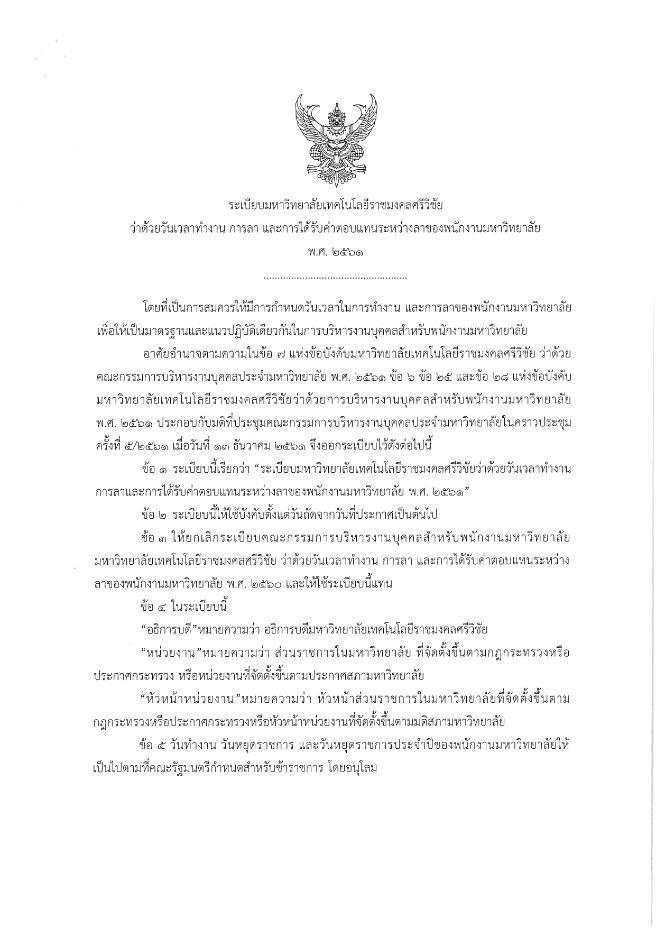Reporters: Mr.Konto Pantongkam, Asst.Dr.Pituk Bunnoon, Asst.Dr.Phatchakorn Areekul, Mr.Sutaporn Getpun
Evidence Date: December 1, 2023
Related SDGs:
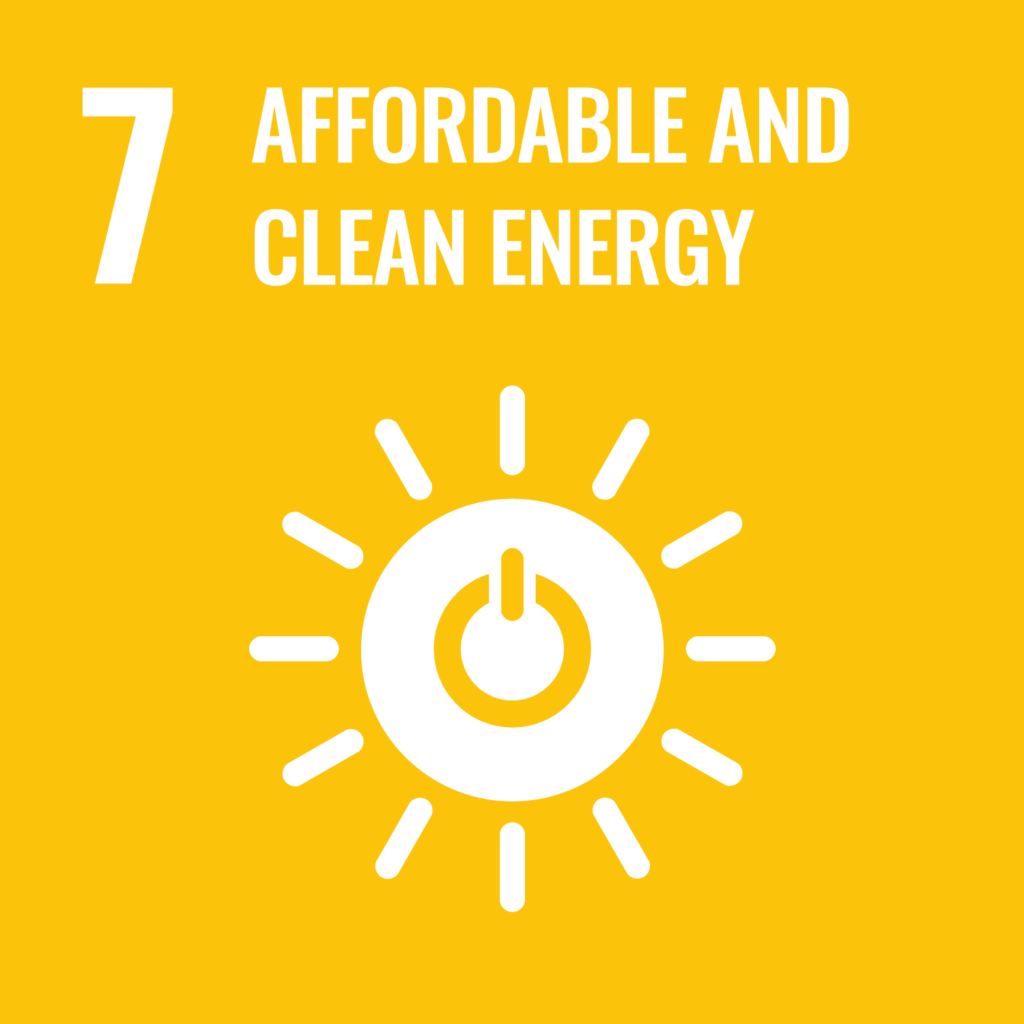
Related Indicators: 7.2.1, 7.2.2
Details:
According to the policy of Rajamangala University of Technology Srivijaya to drive the university towards becoming a Green University that is environmentally friendly, creates a livable community, and serves as a good model for the surrounding community and society, in line with the university’s long-term strategic development plan (2018-2038), the university has declared its policy on environmental management, energy, health, and safety. This policy aims to ensure that all departments, staff, students, and stakeholders participate, become aware of, and carry out environmental management under the framework of the Green University policy in the following six areas:
1. Physical Environment (Setting & Infrastructure)
1.1 Support and promote the review and development of a master plan for the utilization of university space, ensuring that specific plans align with the intended use of areas according to strategy.
1.2 Support and promote the continuous increase of green spaces within the university.
1.3 Support and promote the management of perennial plants, the conservation of trees, and replanting, as well as the restoration of forests and degraded areas to enhance ecosystems and biodiversity.
1.4 Support and promote departments in managing a healthy environment and well-being that facilitates work, teaching, and learning, along with ensuring appropriate safety for staff and students.
2. Energy and Climate Change
2.1 Implement and develop an energy management system to reduce greenhouse gas emissions appropriately, ensuring that departments use energy efficiently and sustainably. This should be integrated into the university’s operations and comply with the Energy Conservation Promotion Act and other related regulations.
2.2 Continuously and appropriately improve energy efficiency in line with usage. Support and promote all university units to reduce energy consumption by upgrading equipment within buildings to energy-saving devices, utilizing technology and best practices, as well as employing renewable energy to reduce energy use and greenhouse gas emissions.
2.3 Support and promote units to develop energy-related innovations, establish best practices for energy conservation, and reduce greenhouse gas emissions, while incorporating renewable energy to lessen energy consumption in various university activities.
2.4 Encourage the use of renewable energy within the university to reach at least 25% by 2026.
2.5 Support the development and renovation of buildings (Building Renovation) and the design of facilities (Passive Design for Building) to be green buildings, energy-saving buildings, and smart buildings.
2.6 Reduce the energy consumption index per person and lower greenhouse gas emissions from various university activities, aiming to become a Carbon Neutral University by 2037.
2.7 Publicize and create awareness about energy conservation among students and university staff, as well as the general public, seriously and continuously.
3. Waste Management
3.1 Support and promote units to reduce waste generation, sort municipal and hazardous waste according to the 3Rs principle: Reduce resource use and waste generation, Reuse, and Recycle, while minimizing plastic and foam use on campus.
3.2 Manage and develop systems to support the reduction, sorting, and efficient management of municipal and hazardous waste from start to finish.
3.3 Focus on waste management and biomass in a zero waste approach (Zero Waste) and utilize waste and biomass for renewable energy conversion and eco-friendly products.
3.4 Manage, control, and develop an effective wastewater treatment system, ensuring water quality meets legal standards.
3.5 Support and promote the development of efficient wastewater collection systems suitable for use, reducing contamination of wastewater entering university water sources.
3.6 Monitor and control the quality of wastewater from units and treated wastewater.
3.7 Support and promote research and development of technologies and innovations for managing wastewater, municipal waste, and hazardous waste.
Here’s the translation:
3.8 Support the reuse of treated wastewater.
3.9 Provide knowledge, support, and promote activities that create discipline and awareness among all staff, students, and the surrounding community to foster an organizational culture for sustainable waste management and efficient resource use.
4. Water Management
4.1 Promote the conservation of tap water, encouraging all units to reduce water usage by upgrading building fixtures to water-saving devices.
4.2 Establish a system to reuse treated wastewater for agricultural purposes instead of using tap water.
4.3 Implement an effective water management system covering surface water management and water reserves for agricultural activities and raw water for producing potable water.
4.4 Ensure the management of potable water that is of sufficient quality and quantity for university consumption.
4.5 Develop a plan to manage water loss by tracking and compiling water usage statistics and creating a database for unit water usage.
4.6 Prohibit the disposal of waste or chemicals into university water sources.
5. Transportation Management
5.1 Limit the number of vehicles entering and exiting the university area, including establishing controlled vehicle zones within the university.
5.2 Ensure traffic safety management.
5.3 Encourage units to promote cycling and walking for travel within the university.
5.4 Limit parking spaces and controlled vehicle zones, promoting walking between buildings.
6. Education & Research Management
6.1 Support courses or short-term training programs related to the environment, energy conservation, and sustainability.
6.2 Provide research funding for the publication of research and academic works, and academic services that create knowledge or enhance sustainability and environmental topics.
6.3 Organize knowledge dissemination, public awareness campaigns, and activities that promote and conserve the environment, reduce energy use, and encourage efficient resource use, including reducing greenhouse gas emissions and preparing for climate change impacts, along with developing green spaces—at least two projects per semester per unit.
6.4 Ensure units manage knowledge dissemination and create awareness regarding environmental conservation, energy conservation, and efficient resource use while reducing emissions.
6.4 Prepare staff, students, stakeholders, and the public for climate change, develop green spaces, and address greenhouse gas emissions.
6.5 Ensure that procurement processes consider or utilize environmentally friendly products, such as those with green labels, products certified under the SIO 14000 or ISO 26000 management systems, or those promoting bio-economy products. All products must also meet industry standards.
6.6 Require unit managers to monitor, inspect, and report monthly changes to the university, along with an annual performance evaluation at least once a year (by August each year).
6.7 Ensure the university and its units promote and implement safety measures concerning the protection of life and property, including university assets, staff health, wellness promotion, campaigns, and prevention measures.
6.8 Allocate budgets related to environmental sustainability and promote sustainability initiatives.
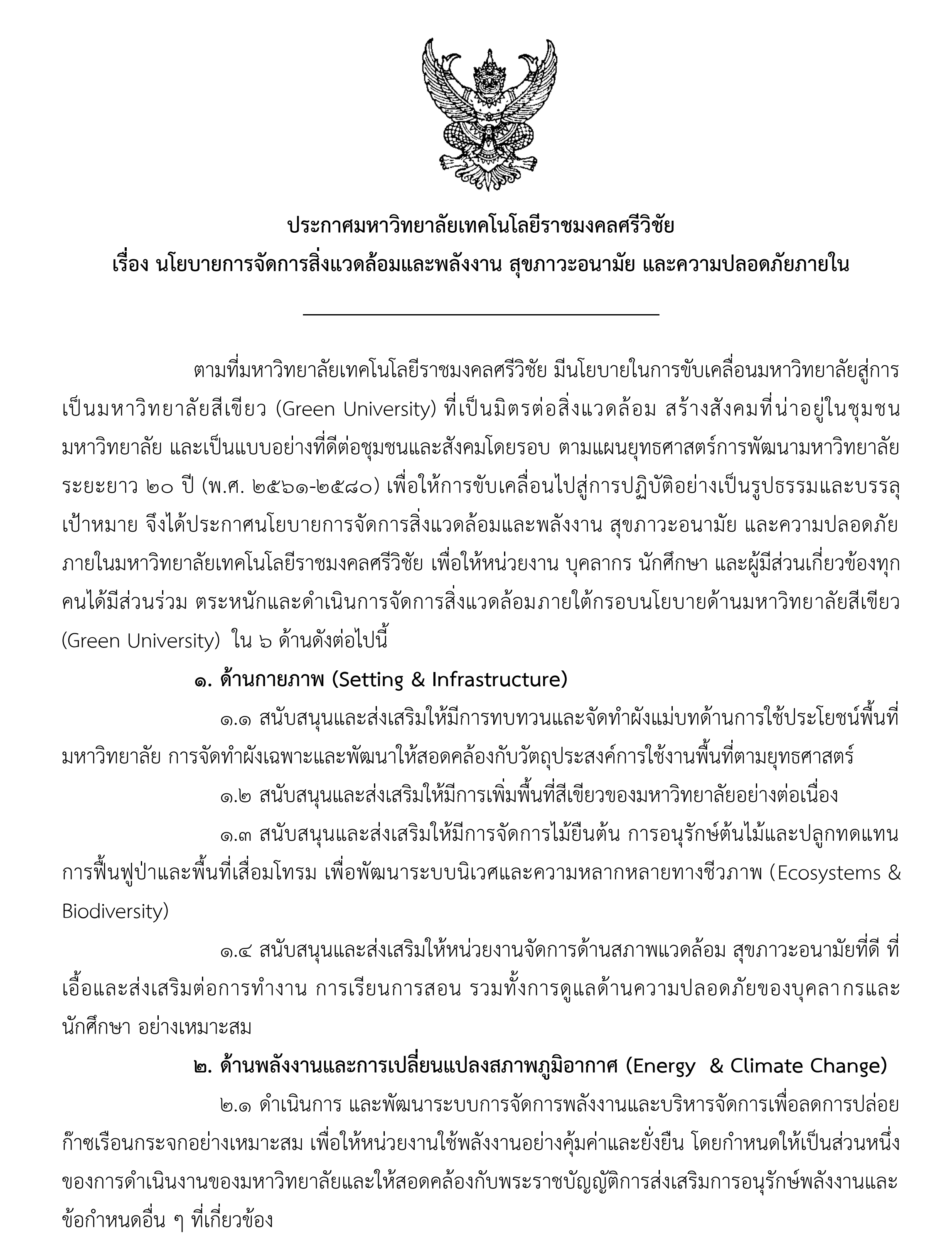
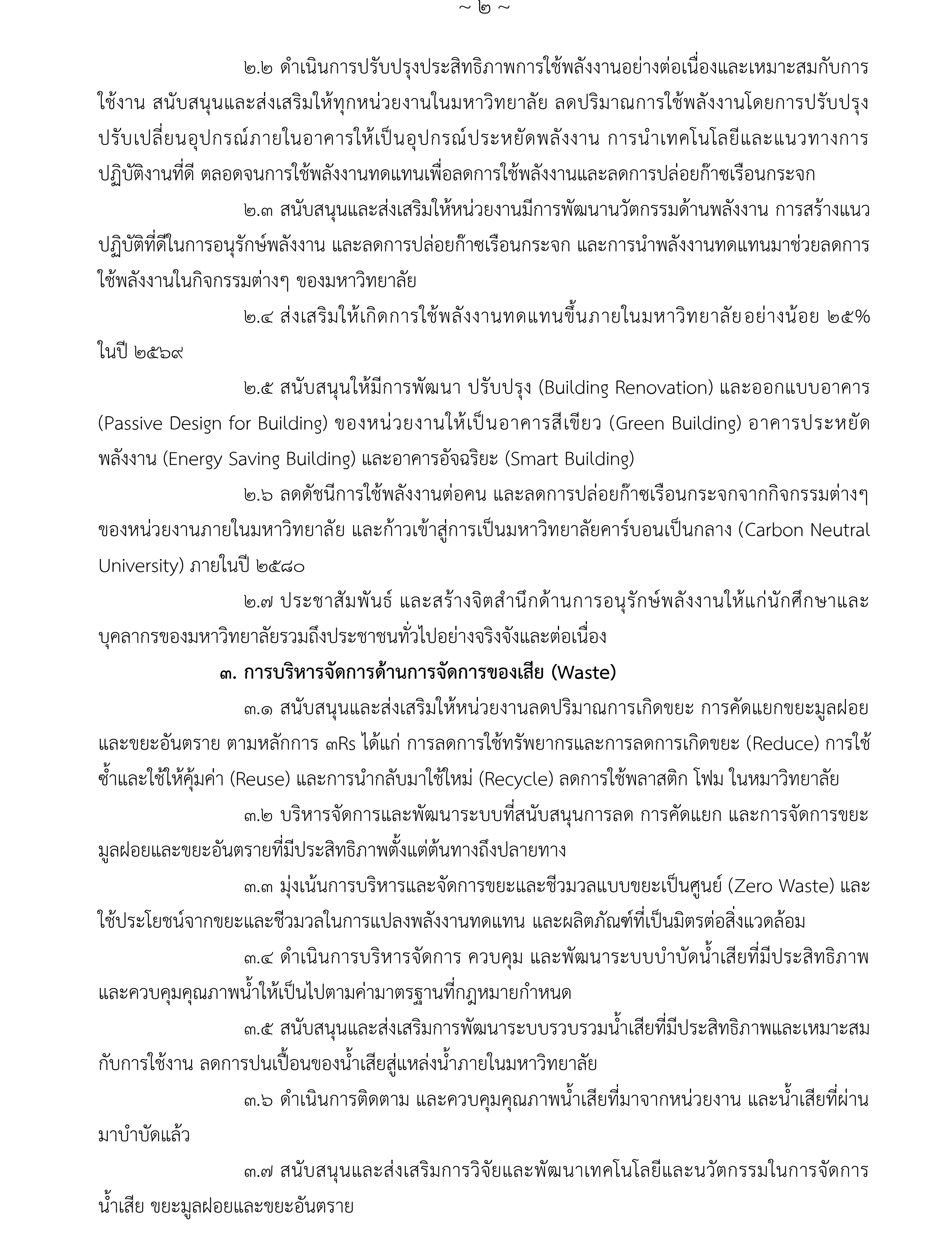

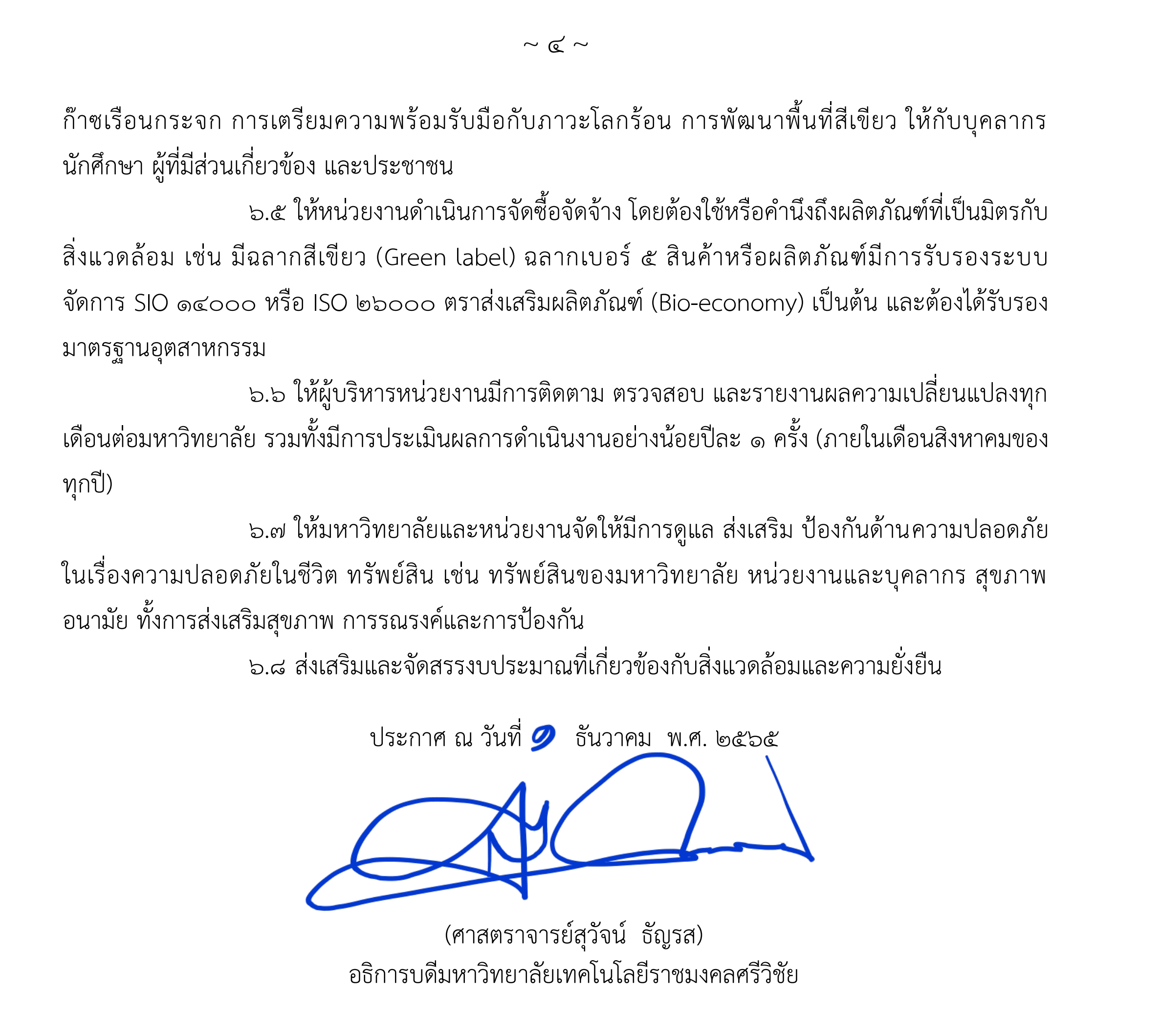
Related Links:

